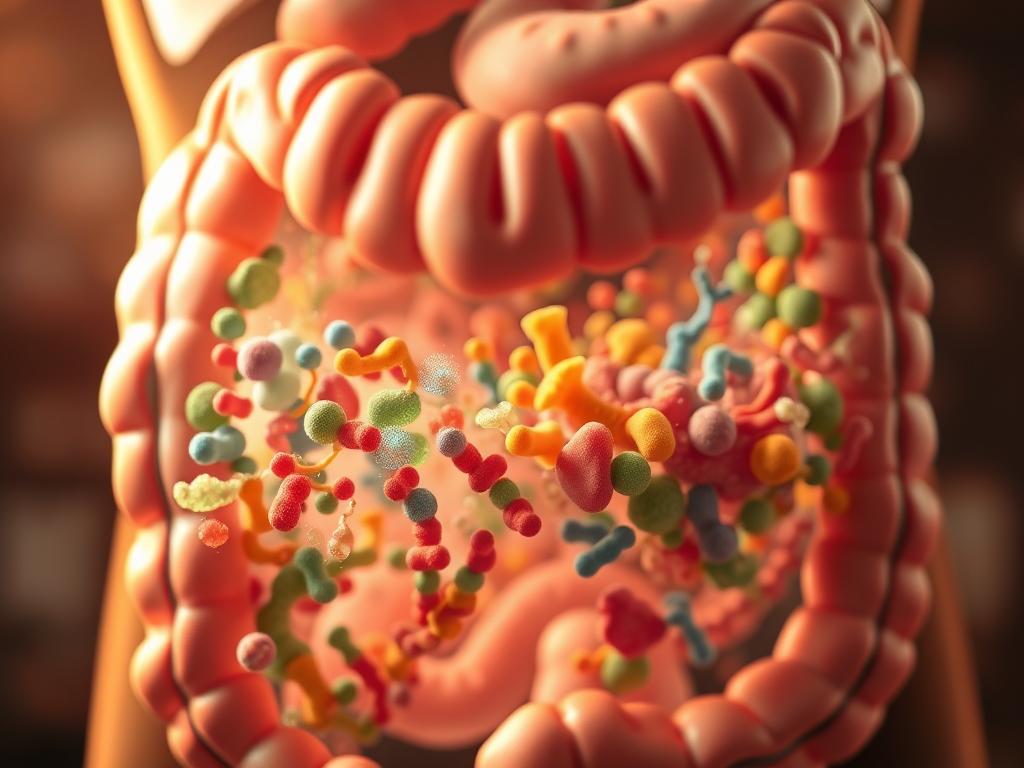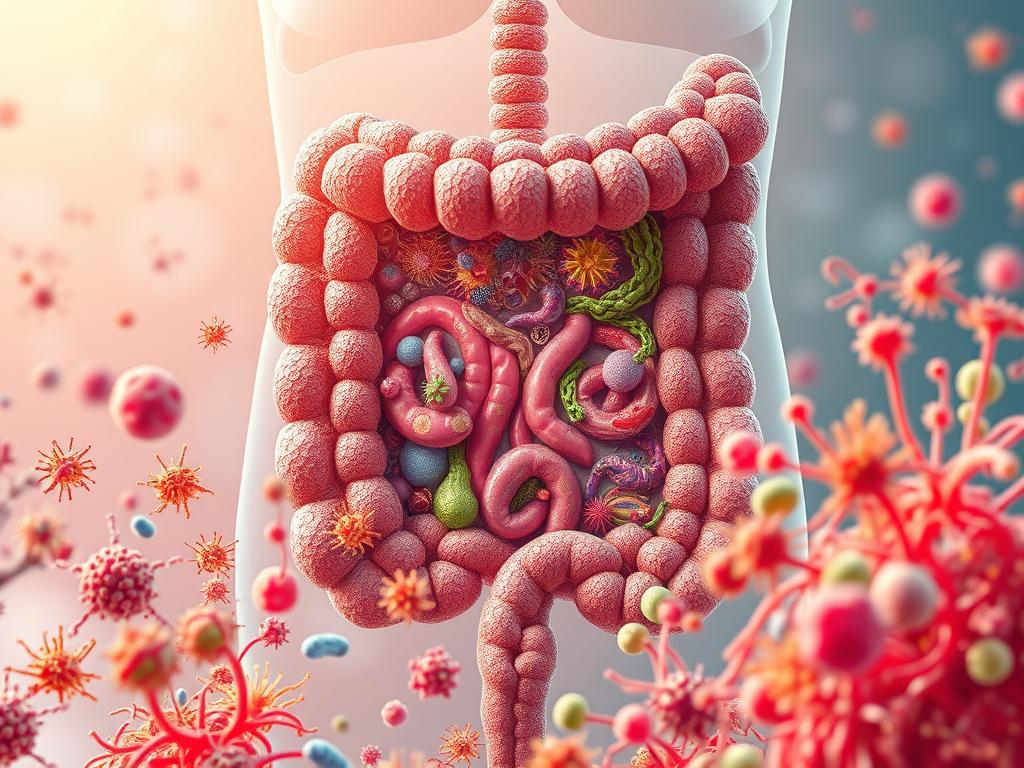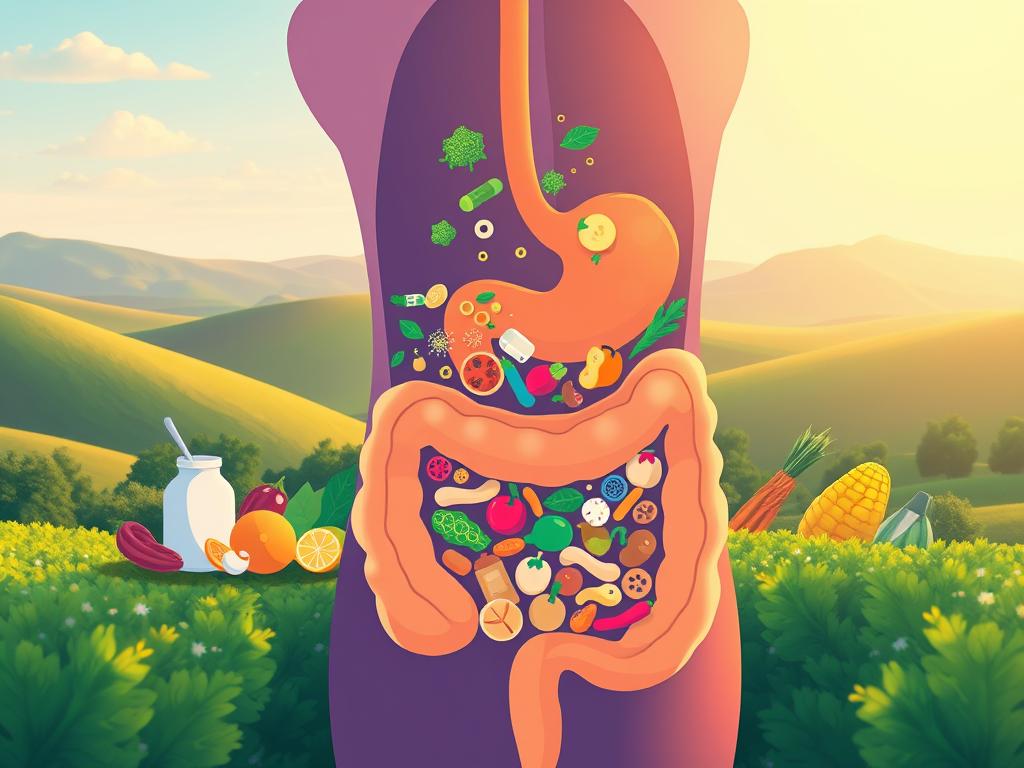Sarah Miller was unaware of how her stress and diet affected her health until she found probiotics. She had been dealing with digestive problems for a long time. These issues didn’t get better with usual treatments.
Probiotics are tiny health helpers inside us. They help keep our gut healthy, boost our immune system, and keep our body in balance. This balance affects digestion and even our mood.
Research shows we have trillions of good bacteria in our bodies. Learning about probiotics opens up a new way to stay healthy. It’s more than just eating right.
Key Takeaways
- Probiotics are living microorganisms essential for bodily functions
- Gut health plays a critical role in overall wellness
- Trillions of beneficial bacteria exist in the human body
- Probiotics support multiple biological systems
- Scientific research continues to explore probiotic benefits
Understanding the Power of Probiotics in Human Health
The world of gut bacteria is key to our health. Your microbiome is a mix of tiny life forms that keep your body in balance. Probiotics, being live microorganisms, offer great health benefits when added to this mix.

Probiotics are more than supplements. They are strong helpers for your body’s natural functions. They work with your gut bacteria to create a healthy balance inside you.
What Makes Probiotics Essential for Wellness
Your microbiome affects many health areas, not just digestion. The main benefits include:
- Supporting immune system function
- Reducing inflammation
- Enhancing nutrient absorption
- Protecting against harmful bacteria
How Probiotics Function in Your Body
Probiotic strains settle in your digestive tract and talk to your gut bacteria. They act as tiny defenders, helping control your immune system, making important nutrients, and keeping harmful bacteria out.
The Science Behind Beneficial Bacteria
Science keeps finding out how gut bacteria help us stay healthy. Probiotics are amazing at changing how cells talk to each other, boosting mental health, and maybe even stopping some long-term diseases.
The human microbiome is a complex ecosystem containing trillions of microorganisms working in symbiotic harmony.
The Complex World of Gut Microbiome

The gut microbiome is a world of tiny life forms inside our digestive system. It’s a community of billions of bacteria, viruses, fungi, and more. These tiny beings are key to keeping our gut healthy.
Exploring the microbiome shows its amazing complexity. Each person has a unique mix of microbes that affects our health and mood. Scientists are still learning how these tiny creatures work with our bodies.
- Contains over 100 trillion microorganisms
- Weighs approximately 2-5 pounds in an average adult
- Houses more than 1,000 different bacterial species
Keeping our gut healthy means having a balanced microbiome. Our diet, stress, meds, and lifestyle affect our microbes. Changes in this balance can cause health problems.
New studies show the microbiome’s incredible abilities. These tiny helpers digest food, make nutrients, control our immune system, and even talk to our brain. They do this through complex chemical signals.
The microbiome is not just a passive passenger in our body, but an active participant in our overall health and well-being.
To care for your gut microbiome, eat a variety of foods, manage stress, and limit antibiotics. By focusing on a balanced microbiome, you help your body fight off sickness and stay healthy.
Natural Sources of Probiotics in Your Diet
Exploring natural probiotic sources can change how you view food. Fermented foods are a great way to improve gut health. They are tasty and good for you, making your diet a key to better health.
Many foods naturally have probiotics, each with its own health perks. The fermentation process helps beneficial bacteria grow. This makes these foods very nutritious.
Fermented Foods as Probiotic Powerhouses
Fermented foods are some of the best probiotic sources. They go through a special process that boosts their health benefits. This process also adds helpful microorganisms.
- Kimchi: A Korean staple packed with probiotics
- Kombucha: Fermented tea with live cultures
- Sauerkraut: Fermented cabbage rich in beneficial bacteria
- Miso: Traditional Japanese fermented soybean paste
Yogurt and Dairy-Based Probiotic Sources
Yogurt is a well-known probiotic food. Not all yogurts are created equal. Choose yogurts with live and active cultures for the best probiotic benefits.
- Greek yogurt: High protein and probiotic content
- Kefir: Liquid yogurt with extensive bacterial strains
- Buttermilk: Traditional fermented dairy drink
Plant-Based Fermented Options
Vegetarians and vegans can find probiotic-rich foods too. These plant-based options offer gut health benefits without dairy.
- Tempeh: Fermented soybean product
- Pickled vegetables
- Natto: Fermented soybeans with powerful probiotics
Pro tip: When selecting fermented foods, choose options with minimal processing to ensure maximum probiotic benefits.
Adding fermented foods to your diet can help your digestion, boost your immune system, and improve overall health. Start with a little and gradually eat more to let your body adjust.
How Probiotics Support Digestive Health
Digestive health is key to feeling good overall. Probiotics are like superheroes for your gut, helping keep it balanced. They work hard to support digestive enzymes and improve gut health in many ways.
Probiotics help your digestive system in several ways:
- They balance the good and bad bacteria in your gut.
- They help your body absorb nutrients better.
- They reduce inflammation in your digestive tract.
- They support the production of digestive enzymes.
Some probiotic strains are especially good at tackling digestive issues. Lactobacillus and Bifidobacterium are known to help with bloating, constipation, and diarrhea.
| Probiotic Strain |
Digestive Health Benefit |
| Lactobacillus acidophilus |
Reduces intestinal inflammation |
| Bifidobacterium longum |
Improves overall gut barrier function |
| Saccharomyces boulardii |
Prevents antibiotic-associated diarrhea |
The gut barrier is a strong defense against illness. Probiotics help make this barrier stronger. This keeps harmful bacteria out and helps your body digest food better.
A healthy gut is the foundation of comprehensive body health.
The Connection Between Probiotics and Immune Function
Your gut is home to about 80% of your immune cells. Probiotics are key in keeping your immune system in balance. They fight off health threats with their beneficial bacteria.
Probiotics and the immune system have a special bond. They act as natural protectors. They boost your immune response and lower inflammation.
Strengthening Your Body’s Defense System
Probiotics offer many benefits for your immune system:
- Boost immune cell production
- Stimulate protective antibody responses
- Improve communication between immune cells
- Create a hostile environment for harmful pathogens
Fighting Inflammation Through Gut Health
Probiotics have amazing anti-inflammatory effects. They keep your gut microbiome balanced. This helps control inflammation in your body. It may lower the risk of chronic inflammation.
Protective Mechanisms of Beneficial Bacteria
Beneficial bacteria protect you in several ways:
- Compete with harmful microorganisms for nutrients
- Make antimicrobial substances
- Strengthen the intestinal barrier
- Support overall immune system resilience
Your gut is not just a digestive system, but a critical component of your immune defense.
Mental Health Benefits of Probiotic Supplementation
The link between gut health and mental well-being is changing how we see mental health. Scientists found a two-way communication path called the gut-brain axis. It connects our digestive system to our brain function.
Research on probiotics is showing how good bacteria can help our mental health. The gut microbiome helps make neurotransmitters that affect our mood and emotions.
- Probiotics may help reduce symptoms of anxiety
- Support potential management of depressive conditions
- Improve overall stress response mechanisms
- Enhance cognitive function and mental clarity
Studies are showing that probiotics might help our mental health. The bacteria in probiotics work with our brain, changing brain chemistry and inflammation.
Our gut is often called the “second brain” due to its intricate neurological connections and significant impact on mental wellness.
More research is needed, but current findings are promising. Keeping a healthy gut microbiome with probiotics might greatly benefit our mental health. People looking for natural ways to improve their mental health might find probiotics interesting.
Skin Health and the Probiotic Connection
Your skin is more than just a shield. It’s a complex world linked to your gut health. The gut-skin axis shows how your internal bacteria affect your skin. Probiotic research has found amazing ways beneficial bacteria can improve your skin.
Managing Skin Conditions Through Gut Health
Skin problems often start inside. Probiotic supplements can tackle different skin issues by boosting your body’s anti-inflammatory powers. Studies show a balanced gut microbiome can help:
- Manage acne
- Lessen eczema
- Reduce psoriasis symptoms
- Control rosacea
The link between gut health and skin is through the immune system. Probiotics help control inflammation, which can lessen skin irritation and lead to clearer, healthier skin.
Anti-Aging Properties of Probiotics
Probiotics hold great promise in fighting skin aging. They help make collagen and shield against environmental harm. By cutting down oxidative stress and supporting cell health, probiotics may:
- Reduce fine lines and wrinkles
- Shield against UV damage
- Boost skin elasticity
- Make skin look brighter
Probiotics can be taken orally or used in skincare products. They offer a new way to keep your skin looking young and healthy from the inside.
Weight Management and Metabolic Benefits
The link between gut bacteria and weight control is really interesting. Your gut microbiome is key to how your body handles food, fat, and hunger. It affects your metabolism a lot.
Studies show how probiotics can help with weight. Your gut is like a complex world that affects your metabolism. It does this in a few main ways:
- It controls hormones that tell you when you’re hungry or full.
- It changes how your body gets energy from food.
- It helps decide how much fat you store.
- It lowers inflammation that can harm your metabolism.
Some gut bacteria can help control weight by:
- Making your body more sensitive to insulin.
- Lowering chronic inflammation.
- Keeping metabolic pathways in balance.
“The microbiome is not just a passenger in our body, but an active participant in our metabolic health.” – Dr. Sarah Johnson, Metabolic Research Institute
New research shows that taking the right probiotics might help with weight control. A balanced gut microbiome is important for a healthy metabolism and weight.
Probiotics aren’t a quick fix for losing weight. But they could be a good way to support your metabolic health and help with weight management.
Choosing the Right Probiotic Supplement
Choosing a good probiotic supplement is important. It’s about finding one that really helps your gut health. You need to know what to look for to get the best results.
It can be hard to pick a probiotic supplement. There are many options, each with its own strengths and benefits. They are made for different health needs.
Understanding CFU Counts
CFU stands for Colony Forming Units. It shows how many live bacteria are in a probiotic. Here are some tips to help you choose:
- For general health, look for 10-15 billion CFU
- For specific health issues, you might need more CFU (20-50 billion)
- It’s not just about the number of bacteria. Quality is key.
Storage and Viability Considerations
How you store your probiotic is crucial. To keep it effective, follow these steps:
- Check the storage temperature it recommends
- Keep it away from heat
- Store it in a cool, dry place
- Make sure to check the expiration date
Quality and Safety Standards
When buying a probiotic, look for these things:
- Third-party testing is a good sign
- Choose strains that have been scientifically studied
- Make sure the ingredients are listed clearly
- Look for prebiotics to boost gut health
Adding prebiotics to your probiotic can make it even better. Talking to a healthcare professional can help you find the right one for you.
Prebiotics: The Essential Probiotic Partner
Prebiotics are key to a healthy gut. They feed the good bacteria in your stomach. This creates a strong team that boosts your health.
Prebiotics are special fibers found in plants. They help good bacteria grow. Unlike probiotics, they don’t live in your gut. Instead, they feed the good guys.
- Promotes growth of beneficial gut bacteria
- Supports digestive system balance
- Enhances nutrient absorption
- Strengthens immune function
Many foods are full of prebiotics:
- Garlic
- Onions
- Bananas
- Whole grains
- Asparagus
“Prebiotics are the foundation of a healthy gut ecosystem, providing essential nutrition for beneficial bacteria.”
Studies show prebiotics do more than just help your gut. They might also improve how your body absorbs minerals and help with your mood. Eating foods rich in prebiotics can make your gut happy.
If you want a boost, try synbiotic supplements. They mix prebiotics and probiotics. This combo is great for your gut and helps keep you healthy.
What to Expect When Starting Probiotics
Starting probiotics is an exciting step towards better gut health. Your body might feel some changes as new good bacteria balance your digestive system.
When you start probiotics, you might notice some changes in your digestion. These could be:
- Mild bloating
- Slight gas production
- Short-term changes in bowel movements
- Temporary digestive discomfort
Understanding these potential responses is crucial for maintaining your probiotic journey. These signs mean your gut is adjusting. They should get better in a few days to weeks.
To lessen side effects, nutrition experts suggest:
- Start with a low-dose probiotic supplement
- Gradually increase your intake
- Take probiotics with food
- Stay hydrated
- Maintain a balanced diet
Most people start seeing benefits in 2-4 weeks. You might feel more comfortable, have regular bowel movements, and more energy.
Remember, everyone’s gut bacteria response is unique. Patience and consistency are key to supporting your digestive wellness.
If symptoms don’t go away or are severe, talk to your doctor. They can check if the probiotic is right for you.
Conclusion
Probiotics are a new area in health science that’s very interesting. They help us understand gut health and how to stay well. More research is needed, but it looks like they’re key to our body’s health.
It’s important to see probiotics as a helpful tool, not a magic fix. Eating foods rich in probiotics and using the right supplements can help. They can make our digestion better, boost our immune system, and even help our minds.
Science is still learning about how probiotics affect our health. If you want to improve your health, think carefully about adding probiotics. Always talk to a doctor and keep up with the latest research.
The study of probiotics is exciting and will keep getting better. As scientists learn more, we’ll see new ways to use probiotics for our health. By staying curious and open, we can use these tiny helpers to keep ourselves healthy and full of energy.
FAQ
What exactly are probiotics?
Probiotics are good bacteria and yeasts in your gut. They help keep your digestive system healthy. This supports digestion, immune function, and nutrient absorption.
How do probiotics differ from prebiotics?
Probiotics are live bacteria, while prebiotics are plant fibers that feed them. Prebiotics help probiotics grow, improving digestion and immune health. Think of prebiotics as fertilizer for your gut bacteria.
Can probiotics help with digestive issues?
Yes, probiotics can help with digestion. They balance gut bacteria, reduce inflammation, and manage issues like bloating and diarrhea. They also help with nutrient absorption and strengthen the gut barrier.
Are fermented foods good sources of probiotics?
Absolutely! Fermented foods like yogurt, kefir, and sauerkraut are full of probiotics. They offer a tasty way to add probiotics to your diet.
Do probiotics support immune function?
Yes, probiotics are key to immune health. About 70% of the immune system is in the gut. They boost the immune system by producing antimicrobial substances and supporting immune cells.
How long does it take to see benefits from probiotics?
Benefits from probiotics can take 2-4 weeks. You might notice better digestion or less bloating. Everyone is different, so keep using them and eat well.
Can probiotics help with mental health?
Research shows probiotics might help with mental health. They could reduce stress and anxiety by affecting neurotransmitters and inflammation. More research is needed.
What should I look for when choosing a probiotic supplement?
Look for these when choosing a probiotic: – Colony Forming Units (CFU) count – Specific, scientifically studied bacterial strains – Third-party testing and quality certifications – Proper storage requirements – Potential combination with prebiotics – Alignment with your specific health goals
Are there any side effects of taking probiotics?
Some might feel mild side effects like bloating or changes in bowel habits. These usually go away quickly. Start with a low dose to avoid discomfort.


